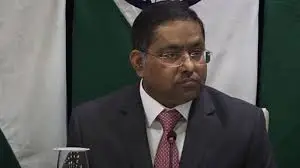‘Expect Turkey to urge Pakistan to…’: What MEA said on India-Pak ties, all-party delegation

New Delhi:
India has issued a strong diplomatic message to Turkey, asking it to urge Pakistan to end its support for cross-border terrorism. The Ministry of External Affairs (MEA) emphasized that healthy international relations rely on mutual respect and sensitivity—especially when it involves the issue of terrorism.
This response came after Turkey extended support to Pakistan following India’s recent military action in Pakistan-occupied Kashmir (PoK), known as Operation Sindoor. India’s position is clear: terrorism cannot be excused under the pretext of diplomacy or solidarity.
MEA’s Clear Message to Turkey
MEA spokesperson Randhir Jaiswal spoke directly on the matter. He said, “We expect Turkey to strongly urge Pakistan to end its support for cross-border terrorism. It must take credible and verifiable action against the terror ecosystem that has existed there for decades.”
His comments followed Turkish President Recep Tayyip Erdoğan’s recent outreach to Pakistan’s Prime Minister, Shehbaz Sharif. Erdoğan praised Pakistan’s restraint and called for an international investigation into the April 22 terror attack in Pahalgam. India has blamed that attack on groups based in Pakistan.
India’s Firm Response: Operation Sindoor
India launched Operation Sindoor after several deadly attacks on its armed forces. The operation targeted terror launchpads across the Line of Control in PoK.
India has made its counter-terror policy crystal clear. It will defend itself when threats emerge from across the border. This military strike was a calculated response aimed at preventing future attacks.
All-Party Delegations Support India’s Narrative
India has also taken diplomatic steps. All-party delegations, including members of the opposition, are visiting multiple countries. These nations include the UAE, Russia, France, and Germany.
The goal of these visits is to explain India’s position and highlight Pakistan’s role in cross-border terrorism. Leaders like Shrikant Shinde have stressed the importance of international awareness. “We are telling the world that India cannot be silent. Nations must not protect or defend terrorism,” he said.
Concerns About Turkey-Pakistan Relations
India has been closely watching the growing ties between Turkey and Pakistan. In recent years, Turkey has backed Pakistan’s stance on Kashmir at global forums.
India considers such comments interference in its internal affairs. The MEA has advised Turkey and other countries to avoid aligning with nations that shelter terrorists. India has repeatedly stated that Kashmir is an internal issue and should not be internationalized.
Domestic Reactions: Political Debate Sparks
Back home, political leaders have reacted strongly. Most support the government’s stand. However, opposition voices like Rahul Gandhi have raised concerns. He questioned whether the MEA had informed Pakistan in advance of Operation Sindoor.
The government dismissed the claim. Officials called the allegation “baseless” and said it insulted India’s armed forces. The MEA reiterated that national security remains a top priority and is handled responsibly.
India’s Broader Strategy: Firm and Transparent
India’s response is part of a bigger diplomatic shift. It wants the global community to treat terrorism as a shared threat. By sending delegations and issuing direct messages to countries like Turkey, India is making its zero-tolerance stance clear.
Experts believe this is a message to other countries too—especially those in the Organisation of Islamic Cooperation (OIC). India wants them to reconsider their support for Pakistan if it continues to shelter terrorist groups.
Conclusion: India Draws a Red Line on Terror
India’s message to Turkey is more than just a reply. It sets a red line. By calling on Turkey to pressure Pakistan, India is saying that diplomatic partnerships cannot ignore terrorism.
Through Operation Sindoor and global outreach efforts, India is showing that it will not stay quiet. It seeks global recognition of the threat it faces and expects the world to act with fairness.
India’s new diplomatic tone is clear—firm, focused, and fearless. It aims to protect its national interests and ensure no country gives a free pass to terrorism.






